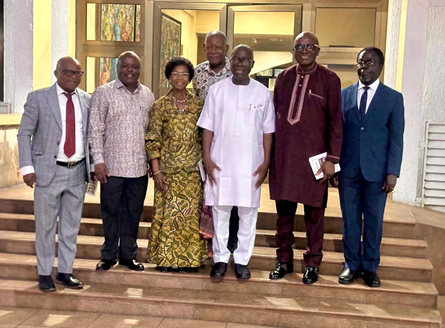By Ernest Bako WUBONTO
In an era increasingly shaped by data-driven governance, renowned strategy and policy expert Professor Kwaku Appiah-Adu has emphasised the imperative of harnessing advanced monitoring and evaluation (M&E) technologies to enhance efficiency within the public sector.
Speaking at an inaugural public lecture organised by the Ghana Academy of Arts and Sciences, Prof. Appiah-Adu highlighted how digital innovations – ranging from big data analytics to blockchain – are redefining M&E systems globally, with tangible benefits for transparency, accountability and policy execution.
“Technologies such as mobile-based data collection platforms and cloud-based analytics tools are significantly improving the accuracy, timeliness and relevance of M&E processes,” he stated.
Drawing comparisons between global best practices and Ghana’s experience, Prof. Appiah-Adu cited Malaysia’s Performance Management and Delivery Unit (PEMANDU) model and Canada’s structured M&E framework as examples of effectively integrating data systems in national policy implementation.
He noted that judicious application of artificial intelligence (AI), cloud-based dashboards and blockchain technology can revolutionise governance in sectors such as healthcare, education, agriculture and social services.
Cloud investment, he added, would allow for real-time data collection, inter-agency sharing and improved collaboration in public service delivery.
Ghana’s M&E evolution
Reflecting on Ghana’s M&E journey, Prof. Appiah-Adu recalled the Policy Coordination, Monitoring and Evaluation Unit’s (PCMEU) establishment between 2002 and 2007, which laid the foundation for sector-specific digital data systems.
“The PCMEU catalysed development of platforms such as the electronic health information system (eHIS), education management information system (eMIS) and agriculture management information system (aMIS), all of which contributed to better-targetted reforms and resource allocation,” he noted.
He praised government’s shift from traditional paper-based M&E practices to digital systems, which created a comprehensive framework for end-to-end M&E processes – from data collection and analysis to public reporting – thus promoting transparency and citizen engagement.
However, he cautioned that the digital transformation of M&E is not without challenges. “Issues of data privacy, cybersecurity, ethical concerns and the digital divide must be addressed to ensure inclusivity and equity in M&E outcomes,” he said.
Call for investment and collaboration
Prof. Appiah-Adu advocated sustained investment in digital infrastructure, capacity building and multi-sector collaboration. He urged governments, academia, the private sector and development partners to jointly develop resilient and scalable M&E frameworks capable of adapting to global disruptions.
He particularly underscored the role of blockchain technology for high-trust data environments, but warned that it must be applied contextually. “Blockchain is a powerful tool for critical, high-integrity data needs in M&E but it is not a one-size-fits-all solution. M&E is the vehicle’s headlights – let no one be left in the dark,” he remarked.
Mindset shift as the cornerstone
The professor concluded that while technology is vital, success in public sector M&E also hinges on institutional integrity, inclusiveness and a cultural shift toward transparency and accountability.
“No amount of technological sophistication will compensate for the absence of a mindset committed to trust and good governance,” he stated.
The lecture, titled ‘Harnessing technology for transformative monitoring and evaluation: A framework for sustainable development’, explored strategic recommendations for integrating technology into governance frameworks, with the ultimate goal of achieving sustainable development through improved accountability and data-led decision-making.










